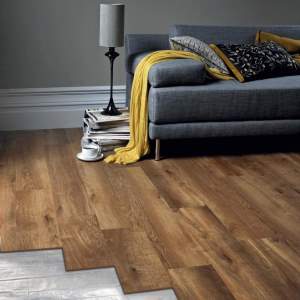Wooden Floors
Whether you are installing engineered wood flooring or natural wooden floorboards, most Warmup electric floor heating systems can be used.
Underfloor Heating for Wooden Floors
![]() Floor heating for wooden floor finishes is increasingly popular amongst homeowners. Warmup systems have been extensively researched and developed for use with a wide variety of wooden floor options. The key with radiant-based heating of wood flooring is the wood’s thermal conductivity; the thinner and denser the wood, the quicker the heat-up time and therefore, the more efficient the system. Using a Warmup Thermostat to control the underfloor heating system facilitates an optimum temperature output that never exceeds 27°C (81°F) – warm enough to heat your home but not too hot that it may damage your wooden flooring.
Floor heating for wooden floor finishes is increasingly popular amongst homeowners. Warmup systems have been extensively researched and developed for use with a wide variety of wooden floor options. The key with radiant-based heating of wood flooring is the wood’s thermal conductivity; the thinner and denser the wood, the quicker the heat-up time and therefore, the more efficient the system. Using a Warmup Thermostat to control the underfloor heating system facilitates an optimum temperature output that never exceeds 27°C (81°F) – warm enough to heat your home but not too hot that it may damage your wooden flooring.
Electric Systems for Wooden Floors
The most frequently used electric underfloor heating system installed with wooden flooring is the Foil Heater. However, read our Buying Guide or Request a quote for a more detailed breakdown of your floor heating options.
Foil Heater System ❯
The Foil Heater system is an electric heating mat that offers quick installation beneath floating wood flooring and other floating floor types. Its foil-wrapped heating wires offer unparralled thermal conductivity into the wooden flooring, allowing rapid heat-up times and efficient and consistent heat distribution.
The Foil Heater system is an electric heating mat that offers quick installation beneath wood flooring and other floating floor types. Its foil-wrapped heating wires offer unparalleled thermal conductivity into the wooden flooring, allowing rapid heat-up times and efficient and consistent heat distribution.
Wood Floor Types
Whilst many Warmup heating systems can be used with wooden flooring finishes, it’s worth noting that care should be taken with some soft-wood flooring as some soft woods may create a thermal barrier, blocking the heat rather than transferring it to the floor surface.
Engineered wood
A common alternative to solid wooden floors, engineered wood is manufactured to give the look and feel of natural wood and is perfect to use with underfloor heating.
Solid wood
Natural, solid wood is typically more expensive than an engineered option and offers different options in density and moisture content which can influence the chosen floor heating system. For solid wood nailing is normally required. For this installation, Warmup recommends the sleeper method.
Thermal Conductivity
When installing an underfloor heating system with a wooden floor, thermal conductivity is an important factor to think about. Ensure the wood is as dense as possible for greater thermal conductivity; the thinner and denser the wood, the quicker the heat-up time.
Floor thickness
While there are no rules for the thickness of the wood you can use with underfloor heating, we recommend that wood thickness should be no more than 18mm as any thicker than this will hinder the efficient performance of the heating system.
Also, as wider boards will often show more “movement” than more narrow boards of the same material, we recommend that the ratio of thickness to width should be in the region of 7 to 11. A board with a thickness of 16mm and width of 160mm would give a ratio of 10, so that would be ideal.
Check with your wood flooring supplier to check for suitability of your chosen floor finish for use with underfloor heating.

Moisture Content of Wooden Floors
Wood is a natural material that absorbs humidity around it; meaning that the moisture content varies depending on the environment. If you were to lay wood flooring with high moisture content in a very dry house, the wood would dry which would cause shrinkage – opening up potential gaps. The floor could also become noisy with creaks as it pulls away from the subfloor.

Humidity
Installing wood flooring in a house that was significantly more humid than the moisture content of the wood flooring finish means the flooring could expand and swell but underfloor heating does not affect humidity.
Speak with your flooring supplier to ensure that the wood flooring has the correct moisture content corresponding to the moisture content of the environment the flooring will be installed in.
Floor Temperature
A wooden floor should never be heated above 27°C (81°F) and a Warmup Thermostat-controlled heating system will guarantee this.
Installation
Electric floor heaters are quick and easy to install by a qualified contractor and the installation of a Warmup electric system can be overseen by our Projects Team for peace of mind.
When installing a system with wooden flooring, an expansion gap should be left around the edges of the room. This can easily be hidden with skirting board and should be about 10mm wide.
Underlay
Warmup’s Insulated Underlay is always recommended for use with a floor heating system used with wooden flooring. The underlay optimises the heat output and efficiency of the heating system and prevents heat from escaping downwards and leaving the room. Underlay also acts as an effective moisture barrier for moisture expansion of the wood.
Limits of Heat Transfer
When using the system with wood flooring, care should be taken to ensure effective performance of the system and we do not recommend installing a floor heater if the limits below are not met. This may hinder the performance of the system and result in the system not working as desired.
The figures below are for electric underfloor heating systems only. Water systems have a broader range of limits due to the variables of the specification.
| Transfer of heat limits | |
| Tog | 1.5 (Unless otherwise stated) |
| RSI | 0.15m² K/W (Unless otherwise stated) |





